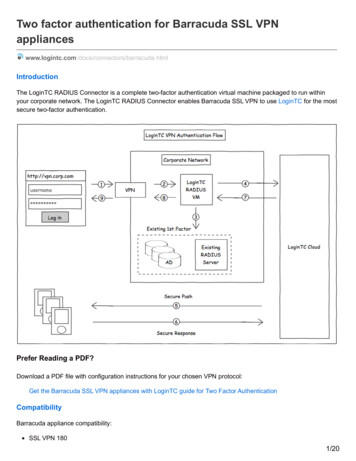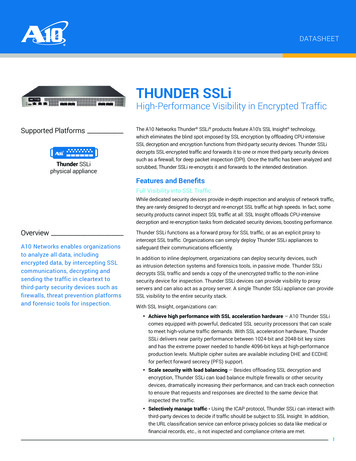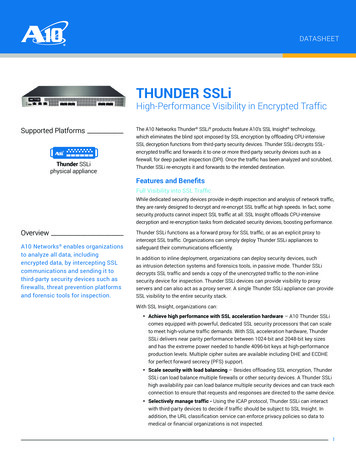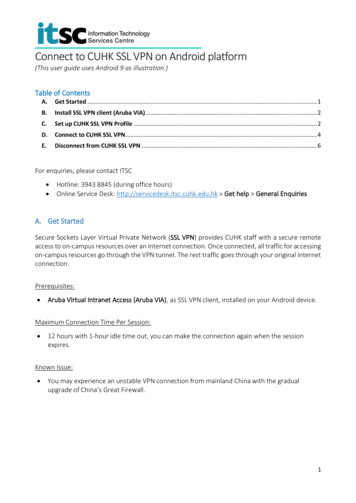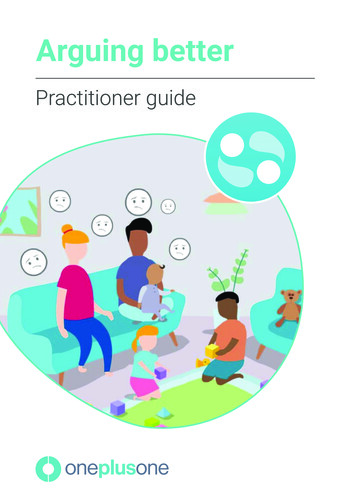
Transcription
Arguing betterPractitioner guide
IntroductionWhat is ‘Arguing better’?Arguing better is an online resource designed to help parents manage their stressand communicate with one another in ways that are helpful to their relationship andtheir children.Arguing better aims to:lRaise awareness of impact of stress on relationships and parental conflicton children.lIncrease parents’ capacity to cope with stress.lSupport parents to develop positive communication strategies to dealwith conflict.This guide is for practitioners who work with parents. It will show you how tointroduce parents to the resource and support them as they work through it.Who is this for?Arguing better is for parents who are still in a relationship with their child’s otherparent and who engage in destructive conflict with their partner. It may also bebeneficial to those who have significant risk indicators:lParental conflict that is frequent, hostile, and unresolved.lSignificant environmental stress.lLack of relational skills.The resource combines evidence-based information, activities, animations, andvideo clips specifically designed for this audience. Arguing better works best whenboth parents do it together. It is divided into three sections:1. Understanding stressThis section helps parents understand how stress affects them and theirrelationship. It helps parents to identify sources of stress.2. Coping with stress togetherThis section helps parents to learn ways of coping with stress together andsupporting each other.Arguing better: practitioner guide (August 2021)page 2
Introduction3. Arguing betterArguments can be constructive (helpful) or destructive (harmful). This sectionhelps parents think about how their arguments start, and how they get out ofhand. Most importantly, it will give them the skills to resolve arguments in moreconstructive ways.How to use this guide with parentsThis guide will help you to support parents working through the Arguing betterresource. It is set up to help you work with parents in person and online.We recommend you ask parents to work through the resource in their own time. Itworks best when they do it together. It will take approximately 30 minutes to workthrough the whole thing, or they can do it one section at a time. It follows a linearpathway to help parents progress from knowledge and understanding to skillsdevelopment.We suggest you have a follow-up call with the couple after they have completedSections 1 and 2, and then again after Section 3 to talk about how they got on. Thiswill give you a chance to check progress, assess understanding, and clarify anyquestions.As this resource is continually being evaluated, we ask parents to answer anumber of questions throughout the course. Please encourage them to completethese, and the questions under Getting started so we can find out more about theeffectiveness of this resource.Arguing better: practitioner guide (August 2021)page 3
1Understanding stressSECTION 1Understanding stressPURPOSElTo raise parents’ awareness about the sources of their stress and how thatcan affect their relationship.lTo identify the causes of stress and enhance the couple’s coping skills.Being parents can be stressful and challenging at the best of times but when thereare additional financial and work pressures, physical and mental health issues –and of course the recent pandemic – then arguments can easily get out of hand.Below, you will see the content that the parents will access in Section 1. You willalso see some suggestions and instructions as to how you can follow up with themafter each section.Arguing better: practitioner guide (August 2021)page 4
1Changes for me and usThe balance of stressFacilitator notesOften, focusing on stress is an easier way for parents totalk about what is happening in their relationship, and tointroduce coping strategies.Discuss the couple’s current sources of stress and theircoping resources. Recap on the questions:lHow often do they feel stressed? A couple of timesa week? Every day? What kinds of things can causeyou stress?lWhich ways of coping do you tend to rely on? Whatsort of things can you do and what support do youhave that helps you to cope?lWhat happens when you feel overwhelmed by stress?Arguing better: practitioner guide (August 2021)page 5
1Changes for me and usHow stress comes aboutFacilitator notesTalk about how stress canbe exacerbated by how weare feeling and the way werespond to it. This helpsparents reframe some oftheir initial thoughts aboutthe source of their stress.Arguing better: practitioner guide (August 2021)page 6
1Changes for me and usMajor events and daily hasslesFacilitator notesThis comic strip shows howdaily hassles can build up ifthey aren’t addressed.Ask the couple if they havebeen able to identify whatadds to their stress on adaily basis. What are thebig life changes they haveexperienced?Emphasise how important itis to talk about the situationand to resolve it before itgets too big.Arguing better: practitioner guide (August 2021)page 7
1Changes for me and usHow stress affects youFacilitator notesFacilitate a conversationusing these two pictures.Ask the couple to identifyhow stress affects them.What are their symptomsand how does that makethem feel?Explain that stress canaffect us physically andmentally. Anxiety, tension,irritability, and tirednesscan all make us shorttempered, which is oftenwhy arguments erupt.Learning to recognise thesesigns can make it easier todeal with stress.Arguing better: practitioner guide (August 2021)page 8
1Changes for me and usInside and outside stressFacilitator notesAssess their understandingof how stress from outsidetheir relationship – such asmoney or in-laws – can spillover into their relationship.Arguing better: practitioner guide (August 2021)page 9
1Changes for me and usStress and relationshipsFacilitator notesStress spills over into therelationships in four main ways –time, communication, health, andbehaviour. Have they been able toidentify the ways stress spills overinto their relationship?Emphasise the main messagefrom the video clip. Darren’s storyshows how easy it is to rely onalcohol or other unhealthy waysof coping with stress. Can thecouple talk about their stresswith each other?Arguing better: practitioner guide (August 2021)page 10
1Changes for me and usWhere stress comes fromFacilitator notesAsk the couple if theyhave identified where theirstress comes from. If theyhave both done a stresstarget, are they the sameor different? What doesthis mean to them andwhat they might do aboutit? Encourage the coupleto reflect on how and whythey become stressed.Arguing better: practitioner guide (August 2021)page 11
1Changes for me and usEnd of section 1: Key messagesFacilitator notesRecap on what the couple have learned so far. Emphasise thekey messages of this section:lStress can affect you, your relationship, and your children.lStress happens when DEMANDS outweigh RESOURCES.lYou may react differently to stress, depending on how youfeel on the day.lStress from DAILY HASSLES can be just as hard to cope withas stress from MAJOR EVENTS.lStress can affect you through your THOUGHTS, FEELINGS,and ACTIONS.lStress can come from INSIDE or OUTSIDE your relationship.lStress from outside can spill over into your relationship.lSome ways of coping can make stress worse, not better.Arguing better: practitioner guide (August 2021)page 12
2Coping with stress togetherSECTION 2Coping with stress togetherPURPOSEThis section is about coping with stress together and some of the ways tosupport each other. It also introduces the five rules for talking about stress.Arguing better: practitioner guide (August 2021)page 13
2Coping with stress togetherHow ‘my stress’ becomes ‘our stress’Facilitator notesEncourage parents to thinkof their stress as sharedstress – something theydeal with together ratherthan from an individualperspective. This is aneffective way of improvingrelationship quality andstability.Arguing better: practitioner guide (August 2021)page 14
2Coping with stress togetherRecognising stressHow do you know when your partner is stressed? How does your partner knowwhen you are stressed?We all show our stress in different ways. One person might cry or get angry, whileanother might be quieter and more withdrawn. Knowing how to recognise this is thefirst step to being able to offer support.We might show stress VERBALLY, by talking about it.We might show it NON-VERBALLY, through our body language and facialexpressions.In the next activity, we’ll ask you to reflect on the different ways that you and yourpartner let each other know when you’re feeling stressed.Facilitator notesPartners will often use avariety of ways to let theirpartner know they arestressed – not all of themhelpful. This activity shouldhelp the couple identifytheir own stress behavioursand reflect on whetheror not they are helpful incommunicating stress totheir partner.Arguing better: practitioner guide (August 2021)page 15
2Coping with stress togetherTalking about stressFacilitator notesPartners will often use avariety of ways to let theirpartner know they arestressed – not all of themhelpful. This activity shouldhelp the couple identifytheir own stress behavioursand reflect on whetheror not they are helpful incommunicating stress totheir partner.Arguing better: practitioner guide (August 2021)page 16
2Coping with stress togetherFive rules for talking about stressFacilitator notesRecap on the learning from the clip and revisitthe rules for communicating stress:1. Stick to the facts2. Say how you feel3. Really listen4. Reflect back5. Ask for supportIf you think the couple are having difficultywith this, there is an additional activity you canuse to help develop the use of ‘I’ statements.Arguing better: practitioner guide (August 2021)page 17
2Coping with stress togetherAdditional activity 1 – ‘I’ statementsEncourage parents to try using ‘I’ statements, focusing on their feelings rather thanusing ‘you’ statements that can come across as an accusation of blame. Using an ‘I’statement helps a person become assertive without making any accusations.‘I feel ’‘When you ’‘Because ’‘What I need is ’It may feel very stange for parents to approach their conversations in this way butwith practice it can really help.Arguing better: practitioner guide (August 2021)page 18
2Coping with stress togetherSupporting each other– practical and emotional supportFacilitator notesAsk the couple if they were able to see the difference when Jasonoffered emotional support to Ada. Could they identify the steps Jasontook to understand Ada’s point of view? Talk about how Jason and Adawere able to sort things out together – a shared responseFind out if the couple have had an opportunity to offer emotional aswell as practical support. If they have found this difficult, there is anadditional activity you can use to help them improve their listening skills.Arguing better: practitioner guide (August 2021)page 19
2Coping with stress togetherAdditional activity 2 – The funnel methodIf the couple needs some extra help in offering each other emotional support, thisadditional activity might help.Ask the couple to tell you about a recent time they felt stressed, focusing on:1. The problem – stating the facts.2. Emotions and thoughts – both in the moment (angry, unsure of what to do) andthe deeper feelings (ashamed, anxious, sad).3. Personal theme – why did it bother me so much?This is the ‘funnel method’ of offering emotional support. You will be modellingrelational skills – empathy, understanding, and acknowledging the other person’sfeelings.e.g. ‘I can see why that might make you feel scared/angry/sad.’Arguing better: practitioner guide (August 2021)page 20
2Coping with stress togetherFinding solutionsNow it’s time to set some goals. A goal can be a thing you want to happen, or a wayyou want to be. Goals are a good way to make sure you use the new skills you arelearning.How to set goalsWhat would you like to do differently? You can either choose your own goal orpick one from our list:lMake a note of daily hassles that are worrying me.lAsk for support when I’m stressed.lLook out for signs of stress in my partner.lAsk my partner questions to find out more.lReassure my partner when they are upset.It’s a good idea to pick something SPECIFIC that feels MANAGEABLE. Ask yourself,“Can I actually do this? How will I know when I’m succeeding?”The most important this is to PRACTISE. Whatever goals you choose, try them outover the next few weeks. The more you practise, the better you will get.Facilitator notesCheck in with the parents to see how they are progressing withtheir goals. If they haven’t set a goal yet, you can help them tochoose one now.They can choose their own goal, or you can suggest one basedon their experiences so far. Some suggestions:lMake a note of daily hassles that are worrying me.lAsk for support when I’m stressed.lLook out for signs of stress in my partner.lAsk my partner questions to find out more.lReassure my partner when they are upset.You can review their progress at the start of the next section.Arguing better: practitioner guide (August 2021)page 21
2Coping with stress togetherEnd of section 2: Key messagesFacilitator notesPlease encourage parents to complete the ‘Check in’ questionsat the end of Section 2.Emphasise the key messages of this section:lMY STRESS or YOUR STRESS is usually OUR STRESS.lThere are lots of different ways to RECOGNISE stress.lSometimes we can tell someone is stressed through theirBODY LANGUAGE.lGive EMOTIONAL support before PRACTICAL support.lThe five rules for talking about stress:1. Stick to the facts2. Say how you feel3. Really listen4. Reflect back5. Ask for supportArguing better: practitioner guide (August 2021)page 22
3Arguing betterSECTION 3Arguing betterPURPOSETo help parents develop skills in communication and managing conflict, sothey can argue in ways that are better for their relationship and better fortheir children.Arguments can be constructive (helpful) or destructive (harmful). This sectionhelps parents think about how their arguments start, and how they get out ofhand. Most importantly, it will give them the skills to resolve arguments in moreconstructive ways.Arguing better: practitioner guide (August 2021)page 23
3Arguing betterArguing betterFacilitator notesAll couples argue but some conflict behaviours are moredamaging than others. Encourage the parents to reflecton their own behaviour and how that might make eachother feel.lWhat harmful things do they say or do in anargument?lWhat do they each do in response?lHow does that make them feel?Ask them to think about the way they argue, and how itmight make their children feel. For many parents, thiscan provide the motivation for behaviour change.Arguing better: practitioner guide (August 2021)page 24
3Arguing betterHow conversations get out of handFacilitator notesDiscuss the animation.Ask the couple to identifywhat they argue about andwhy, and to think about howlittle things can turn into bigarguments. Understandingwhy arguments happen isthe first step in stoppingthem from getting out ofcontrol.Arguing better: practitioner guide (August 2021)page 25
3Arguing betterThe magic ratioFacilitator notesThe difference between happy and unhappycouples is the balance between positive andnegative interactions in their relationship. The“magic ratio” is 5 to 1.For a relationship to remain stable and happy,it needs at least five positive interactions tobalance out each negative reaction.Encourage the couple to think about the thingsthey do to make each other feel cared for. Whatare the positive things they say and do with oneanother?Arguing better: practitioner guide (August 2021)page 26
3Arguing betterWhere you’re atFacilitator notesThe sliding scale tool is used both for assessment (Where are you at? How well do youcurrently get on?) and solution-focused discussion (Where would you like to be?).Explain that relationships can move up and down a scale. The umbrella symbolises thefactors that help protect relationships during difficult times – humour, affection, timetogether, support, etc.Ask parents to share with you where they think they are on this scale.This will highlight how they see their level of conflict and if there are any discrepancies.These are the questions they will have explored:lWhere do you think you and your partner are on this scale?lWould your partner agree?lWhere would you like to be?Use solution-focused questions to come up with ideas specific to the couple ifthey haven’t already done this. Talk about how they would like their relationship orcommunication to be different and how they can build on their strengths.These questions can help parents think about:lWhat would it look like if things were better?lWhat would be happening?lWhat needs to change before you can get there?lWhat could you and your partner do differently?lHow have you made up after falling out in the past?Offer positive affirmations on any progress so far. Behaviour change can be difficult formany parents.Arguing better: practitioner guide (August 2021)page 27
3Arguing betterA harmful argumentFacilitator notesDiscuss the first clip, ‘Aharmful argument’, withthe couple. Did they spothow destructive (harmful)conflict behaviours causedthe argument to escalate?Jason and Ada were critical,defensive, blaming eachother and trying to win theargument.Arguing better: practitioner guide (August 2021)page 28
3Arguing betterA helpful argumentFacilitator notesDiscuss the second clip, ‘A helpful argument’, withthe couple. Did they spot how constructive (helpful)conflict behaviours allowed Ada and Jason to resolvethe argument in a more helpful way? Jason stayedcalm and listened to Ada. This helped Ada to tell himhow she felt.Encourage the couple to reflect on how Ada and Jasonsaw things from each other’s point of view. What didthey learn about how to handle an argument?Remind them that the next time they get into anargument with one another, the first step is to STOP:lStay calm.lListen.lTry to see things from your partner’s point of view.Arguing better: practitioner guide (August 2021)page 29
3Arguing betterFinding solutionsFacilitator notesCheck in with the couple. Have they been able to set agoal? If not, you may have to make some suggestions.Start small and encourage them to practise regularly.Here are some suggestions:lStay calm – take a deep breath before I respond.lListen to my partner without jumping in.lTry to see it from my partner’s point of view.lNotice when I blame or criticise.lTake a break if I start getting angry.lSay two positive things to my partner every week.You can give positive feedback on their progress so farand encourage them to keep practising.Arguing better: practitioner guide (August 2021)page 30
3Arguing betterA few questions to finishPlease encourage parents to complete the questions at the end of Section 3.Feedback from parentsOnePlusOne are continuously evaluating this digital resource. We are keen tounderstand how well parents have understood the content of Arguing betterand whether it has a positive effect on their behaviour. For that reason, there arequestions, using standardised measures, woven into the resource to gauge parents’responses and outcomes. We would really appreciate it if you could encourageparents to complete all of the questions by letting them know that their feedbackand participation is important in making the resource the best it can be.Arguing better: practitioner guide (August 2021)page 31
3Arguing betterEnd of section 3: Key messagesFacilitator notesCheck in with the parents to see how they are progressingwith their goals. You may want to make another appointmentto check how they are progressing and the changes they aremaking.Emphasise the key messages of this section:lHARMFUL arguments can be BAD for your relationship.lHELPFUL arguments can be GOOD for your relationship.lWe all have LOGS and MATCHES, but we also have ways toCALM thing down.lFor every NEGATIVE MOMENT between you and your partner,you need FIVE POSITIVE MOMENTS to balance it out.lWhen things get tough, the first step is to STOP arguing.Arguing better: practitioner guide (August 2021)page 32
OnePlusOnec/o MHA MacIntyre Hudson6th Floor2 London Wall PlaceLondonEC2Y 5AU8 info@oneplusone.org.ukAll content copyright OnePlusOne 2021
Recap on what the couple have learned so far. Emphasise the key messages of this section: l Stress can affect you, your relationship, and your children. l Stress happens when DEMANDS outweigh RESOURCES. l You may react differently to stress, depending on how you feel on the day. l S
